Browse our Growing Library of Success Stories
By:
Leopold Conservation Award Program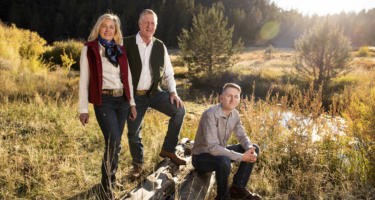 An inspiring transformation at Witcher Creek Ranch is thanks to Marie and Glenn Nader’s willingness to think big and bold.
An inspiring transformation at Witcher Creek Ranch is thanks to Marie and Glenn Nader’s willingness to think big and bold.
Marie, Glenn, and their son, Alan, are dedicated to promoting water conservation and soil health on a working cattle ranch. They credit state and federal conservation-focused programs and grants with helping them make dramatic changes on their 2,880 acres of Modoc County.
https://www.landcan.org/success/Marie-and-Glenn-Nader/3763/
By:
Leopold Conservation Award Program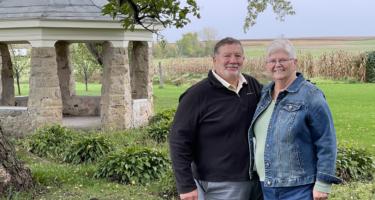 They’ve worked shoulder to shoulder to improve their farm’s environmental and economic resilience with conservation practices and direct marketing.
They’ve worked shoulder to shoulder to improve their farm’s environmental and economic resilience with conservation practices and direct marketing.
Both were born on Wisconsin farms, but their path back to farming was hard won. They worked off-farm jobs out West before saving enough for a down payment on 280 acres in Columbia County in 1986. After growing asparagus with John’s brother, their first years of raising livestock and row crops were met with struggle due to low commodity prices.
https://www.landcan.org/success/John-and-Dorothy-Priske/3762/
By:
Leopold Conservation Award Program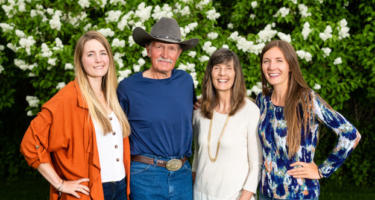 Kelly Flynn taught his daughters to raise a baby lamb, ride a horse, and ultimately, run a ranch.
Kelly Flynn taught his daughters to raise a baby lamb, ride a horse, and ultimately, run a ranch.
His land ethic was passed down from relatives who carved a living from the land since the 1860s. He recalled his aging parents pulling weeds on hot days. With those values etched in his mind, he spent a life caring for livestock, wildlife, and 6,000 acres of meadows, creeks and forests.
https://www.landcan.org/success/Hidden-Hollow-Hideaway-Cattle-and-Guest-Ranch/3761/
By:
Leopold Conservation Award Program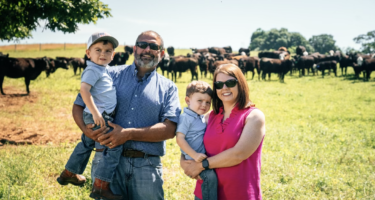 Farming land his grandmother once owned, Fred L. Sipes says he’s a caretaker of a precious resource.
Farming land his grandmother once owned, Fred L. Sipes says he’s a caretaker of a precious resource.
Fred began growing 50 acres of burley tobacco, fresh out of high school in 1994. Even then, conservation was important to him. He knew consistent improvement and diversification would be critical to his farm’s survival.
https://www.landcan.org/success/FL-Sipes-Farms/3760/
By:
Leopold Conservation Award Program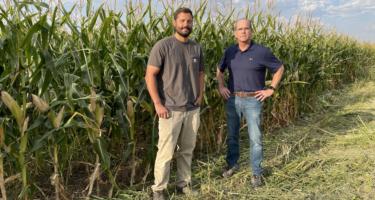 Grow crops with less water. That challenge spurred an ever-expanding land ethic in Dwane Roth.
Grow crops with less water. That challenge spurred an ever-expanding land ethic in Dwane Roth.
Dwane knew of the declining water level in the Ogallala aquifer he farms above. He felt he was already doing his part by increasing crop yields with reduced equipment and labor costs. Then a cropland landlord challenged him to look into irrigation technology.
https://www.landcan.org/success/Dwane-Roth/3759/
By:
Leopold Conservation Award Program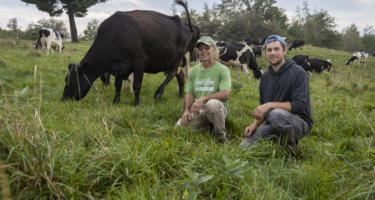 Guy Choiniere believes the health of the soil is the health of the farm. This land ethic drives his actions on a dairy farm that’s been in the Choiniere family since 1945.
Guy Choiniere believes the health of the soil is the health of the farm. This land ethic drives his actions on a dairy farm that’s been in the Choiniere family since 1945.
While navigating changes in the farm economy, climate and farming practices, the Choiniere Family Farm has become a model of innovation and adaptability for other New England dairies.
https://www.landcan.org/success/Choiniere-Family-Farm/3758/
By:
Southwest Georgia Farm Credit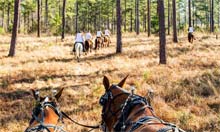 In today’s fast-paced society, it’s easy to wonder if the plantation economy is truly sustainable and whether or not the large landownership will remain. But transactions in recent years show a commitment that assures these legacy properties will remain as working rural lands and not as supersized residential developments.
In today’s fast-paced society, it’s easy to wonder if the plantation economy is truly sustainable and whether or not the large landownership will remain. But transactions in recent years show a commitment that assures these legacy properties will remain as working rural lands and not as supersized residential developments.
Read about the Red Hills Ecosystem »
https://www.landcan.org/success/What-keeps-the-Red-Hills-Region-sustainable/3741/
By:
Leopold Conservation Award Program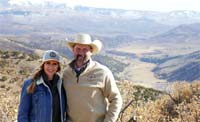 For Colby and McKenzie Pace, raising beef cattle includes keeping a sharp eye on preventing overgrazing and noxious weeds and seeking out ways to improve their land for nesting and migrating shorebirds. This forward-thinking approach to livestock and wildlife management earned the Coalville couple — and their Half Circle Cross Ranch — the 2020 Utah Leopold Conservation Award.
For Colby and McKenzie Pace, raising beef cattle includes keeping a sharp eye on preventing overgrazing and noxious weeds and seeking out ways to improve their land for nesting and migrating shorebirds. This forward-thinking approach to livestock and wildlife management earned the Coalville couple — and their Half Circle Cross Ranch — the 2020 Utah Leopold Conservation Award.
https://www.landcan.org/success/Half-Circle-Cross-Ranch/3621/
By:
Leopold Conservation Award Program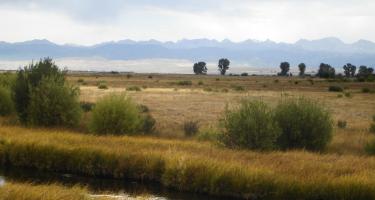 The Sommers family has been ranching cattle in Sublette County, Wyoming since 1907 when Albert “Prof” Sommers and his brother, Pearl, established the ranch.
The Sommers family has been ranching cattle in Sublette County, Wyoming since 1907 when Albert “Prof” Sommers and his brother, Pearl, established the ranch.
https://www.landcan.org/success/Sommers-Ranch/3447/
By:
Leopold Conservation Award Program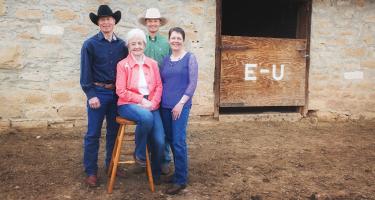 In 1882, the Kane family patriarch, Philip Kane, staked his claim to 320 acres at the base of the Big Horn Mountains along Big Goose Creek. The ranch has undergone a lot of changes over the years, growing into roughly 30,320 acres and running about 1100 cows and 240 yearling replacement heifers. The fourth generation ranch is currently owned and managed by David and his wife Terri, and will be shepherded into the fifth generation by their son Nate.
In 1882, the Kane family patriarch, Philip Kane, staked his claim to 320 acres at the base of the Big Horn Mountains along Big Goose Creek. The ranch has undergone a lot of changes over the years, growing into roughly 30,320 acres and running about 1100 cows and 240 yearling replacement heifers. The fourth generation ranch is currently owned and managed by David and his wife Terri, and will be shepherded into the fifth generation by their son Nate.
https://www.landcan.org/success/SR-Cattle-Company/3448/
By:
Leopold Conservation Award Program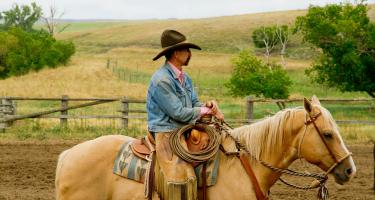 Homer and Mildred Scott started Padlock Ranch in 1943 with 300 cows and 3000 acres purchased in the Dayton, Wyoming area. Little did they know the ranch would grow to run 11,000 head of cattle on approximately 475,000 acres straddling the Wyoming/Montana state line.
Homer and Mildred Scott started Padlock Ranch in 1943 with 300 cows and 3000 acres purchased in the Dayton, Wyoming area. Little did they know the ranch would grow to run 11,000 head of cattle on approximately 475,000 acres straddling the Wyoming/Montana state line.
https://www.landcan.org/success/Padlock-Ranch/3445/
By:
Leopold Conservation Award Program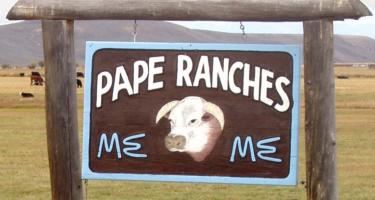 Norm Pape will tell you that family is the most important factor in the success of Pape Ranches. The operation is run entirely by Norm and Barbara Pape and their sons, David and Fred, and their families.
Norm Pape will tell you that family is the most important factor in the success of Pape Ranches. The operation is run entirely by Norm and Barbara Pape and their sons, David and Fred, and their families.
https://www.landcan.org/success/Pape-Ranches/3446/
By:
Leopold Conservation Award Program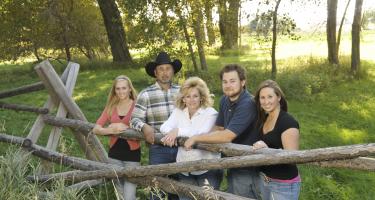 The century-old King Ranch sits just outside of Cheyenne. After the passing of one of the ranch owners, the ranch management was left in the hands of Mark Eisele, who has worked on the ranch since the 1970s. Today, Mark, along with his wife Trudy and their family, proudly carry on the ranching tradition at King Ranch.
The century-old King Ranch sits just outside of Cheyenne. After the passing of one of the ranch owners, the ranch management was left in the hands of Mark Eisele, who has worked on the ranch since the 1970s. Today, Mark, along with his wife Trudy and their family, proudly carry on the ranching tradition at King Ranch.
https://www.landcan.org/success/King-Ranch/3443/
By:
Leopold Conservation Award Program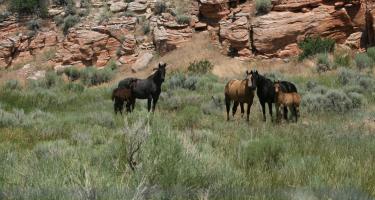 Using the money from the sale of his Texaco gas station in 1937, Labon Garrett, along with his father and grandfather, Henry and Adron, purchased the first 2,000 acres of Garrett Ranch. The ranch now belongs to Pete, Labon’s son, and Pete’s wife, Ethel, who manage the ranch activities with their children and grandchildren.
Using the money from the sale of his Texaco gas station in 1937, Labon Garrett, along with his father and grandfather, Henry and Adron, purchased the first 2,000 acres of Garrett Ranch. The ranch now belongs to Pete, Labon’s son, and Pete’s wife, Ethel, who manage the ranch activities with their children and grandchildren.
https://www.landcan.org/success/Garrett-Ranch/3441/
By:
Leopold Conservation Award Program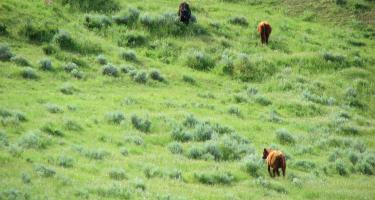 The 2007 Leopold Conservation Award for Wyoming is presented to Paul and Catherine Kukowski and their family. The Kukowskis run more than 800 head of cattle on their 20,000-acre Golden Willow Ranch in Sheridan County.
The 2007 Leopold Conservation Award for Wyoming is presented to Paul and Catherine Kukowski and their family. The Kukowskis run more than 800 head of cattle on their 20,000-acre Golden Willow Ranch in Sheridan County.
https://www.landcan.org/success/Golden-Willow-Ranch/3442/
By:
Leopold Conservation Award Program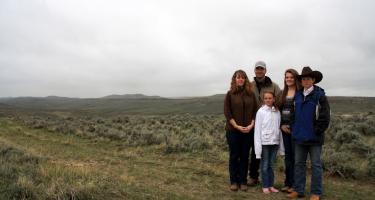 Ryan and Teresa Fieldgrove’s ranch, located near Buffalo, is a cow/calf range operation consisting of over 10,000 acres of deeded and leased land. Ryan Fieldgrove’s family has ranched in the area for over 125 years with his children representing the fifth generation to be involved. The Fieldgroves place a high value on passing a land ethic on to their children.
Ryan and Teresa Fieldgrove’s ranch, located near Buffalo, is a cow/calf range operation consisting of over 10,000 acres of deeded and leased land. Ryan Fieldgrove’s family has ranched in the area for over 125 years with his children representing the fifth generation to be involved. The Fieldgroves place a high value on passing a land ethic on to their children.
https://www.landcan.org/success/Fieldgrove-Ranch/3439/
By:
Leopold Conservation Award Program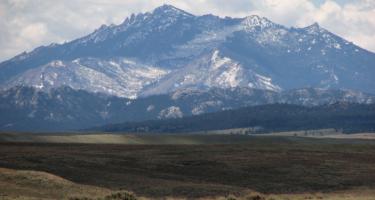 Three generations of Foys keep Foy Ranch running at a high level. Rocky and Nancy, their children, Josh, Emily, and Paul, and Rocky’s parents, Leo and Ann, all pitch in to make the ranch a success.
Three generations of Foys keep Foy Ranch running at a high level. Rocky and Nancy, their children, Josh, Emily, and Paul, and Rocky’s parents, Leo and Ann, all pitch in to make the ranch a success.
https://www.landcan.org/success/Foy-Ranch/3440/
By:
Leopold Conservation Award Program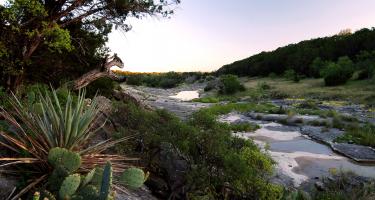 The Treadwell Brady Ranch implements all five of famed conservationist Aldo Leopold’s essential tools: axe, cow, plow, fire and gun. Efforts include habitat management, erosion control, supplemental food, water and shelter for wildlife, predator control, and wildlife population surveys.
The Treadwell Brady Ranch implements all five of famed conservationist Aldo Leopold’s essential tools: axe, cow, plow, fire and gun. Efforts include habitat management, erosion control, supplemental food, water and shelter for wildlife, predator control, and wildlife population surveys.
https://www.landcan.org/success/Treadwell-Brady-Ranch/3413/
By:
Leopold Conservation Award Program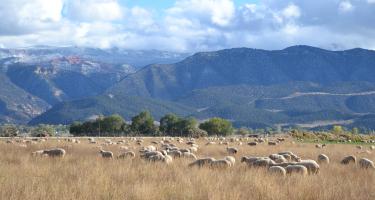 Dennis Stowell was president and CEO of H.A. Farms Inc. from 1980 until 2011. The sheep and cattle operation totals nearly 3000 acres of private land and is also comprised of forest and BLM permits for sheep and cattle in Parowan, Utah. Dennis and his wife Marilee took over the business from Marilee’s father, Harvey Adams, for whom the operation is named.
Dennis Stowell was president and CEO of H.A. Farms Inc. from 1980 until 2011. The sheep and cattle operation totals nearly 3000 acres of private land and is also comprised of forest and BLM permits for sheep and cattle in Parowan, Utah. Dennis and his wife Marilee took over the business from Marilee’s father, Harvey Adams, for whom the operation is named.
The family’s roots run deep in this part of Utah. Ancestors started ranching in Parowan in the 1850s, and descendants have been farming and ranching in the same valley ever since.
https://www.landcan.org/success/HA-Farms/3418/
By:
Leopold Conservation Award Program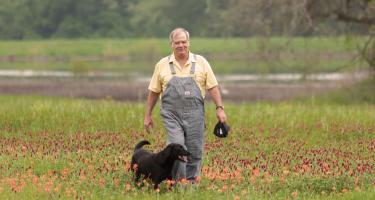 Dr. Robert McFarlane spent his youth hunting and fishing the lands and waters of the Middle Trinity River near Tennessee Colony. Those memories of the land stayed with him when he left for medical school at Harvard. When he returned, he saw a different landscape. It was fragmented, converted to pasture and farmland, and significantly different from the pristine land he remembered.
Dr. Robert McFarlane spent his youth hunting and fishing the lands and waters of the Middle Trinity River near Tennessee Colony. Those memories of the land stayed with him when he left for medical school at Harvard. When he returned, he saw a different landscape. It was fragmented, converted to pasture and farmland, and significantly different from the pristine land he remembered.
https://www.landcan.org/success/The-BigWoods-on-the-Trinity/3412/
 Sign In
Sign In
 Sign In
Sign In
